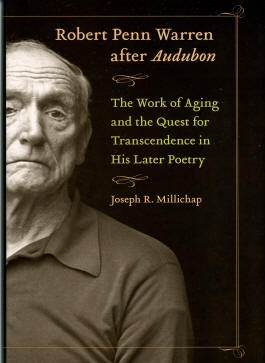|
►"Robert
Penn Warren was a permanent poet, as future generations will demonstrate.
Fashions rise and ebb but Warren's greatest dramatic lyrics stand with the
best American poetry of the twentieth century, with Frost, Stevens, Eliot,
and Hart Crane. Millichap's book is a poignant analysis of Warren's
triumphant struggle to achieve a secular transcendence in the poems of his
old age. As someone who continues to miss Red Warren, I believe he would
have endorsed much in Millichap's book."—Harold
Bloom, author of The Best Poems of the English Language:From Chaucer
through Robert Frost◄ ►"The
major critical studies of twentieth-century American poetry agree that
Robert Penn Warren has taken his place among the giants and, moreover, that
his greatest accomplishment began in Audubon: A Vision and continued
in the six collections that followed. In that remarkable wake have also come
terrific studies of what made Warren's poetry brilliantly and passionately
introspective, simultaneously public and personal, but none is more
intuitive, informed, or illuminating than Joseph R. Millichap's Robert
Penn Warren after 'Audubon'. I thought I knew Warren's sequences, his
antinomies, his orchestrations, his composition by parallelism that rivals
Whitman, his allusions, echoes, and absorptions of the circles of poetry.
But Millichap proves to be an invaluable guide, a reader of Warren no other
reader can afford to miss. Hurrah for this splendid book!"—Dave Smith,
author of Hunting Men: Reflections on a Life in American Poetry◄
Despite nearly universal critical acclaim for
Robert Penn Warren’s later poetry, much about this large body of work
remains unexplored, especially the psychological sources of these poems’
remarkable energy. In this groundbreaking work, Warren scholar Joseph R.
Millichap takes advantage of current research on developmental psychology,
gerontology, and end-of-life studies to offer provocative new readings of
Warren’s later poems, which he defines as those published after Audubon:
A Vision (1969). In these often intricate poems, Millichap sees
something like an autobiographical epic focused on the process of aging, the
inevitability of death, and the possibility of transcendence. Thus Warren’s
later poetry reviews an individual life seen whole, contemplates mortality
and dissolution, and aspires to the literary sublime.
Millichap locates the beginning of Warren’s late period in the
extraordinary collection Or Else: Poem/Poems 1968–1974, basing his
contention on the book’s complex, indeed obsessive sequencing of new,
previously published, and previously collected poems unified by themes of
time, memory, age, and death. Millichap offers innovative readings of Or
Else and Warren’s five other late gatherings of poems—Can I See
Arcturus from Where I Stand?: Poems 1975; Now and Then: Poems 1976–1978,
winner of the Pulitzer Prize; Being Here: Poetry 1977–1980; Rumor
Verified: Poems 1979–1980; and Altitudes and Extensions 1980–1984.
Among the autobiographical elements Millichap brings into his careful
readings are Warren’s loneliness in these later years, especially after the
deaths of family members and friends; his alternating feelings of personal
satisfaction and emptiness toward his literary achievements; and his sense
of the power, and at times the impotence, of memory. Millichap’s analysis
explores how Warren often returned to images and themes of his earlier
poems, especially those involving youth and midlife, with the new
perspective given by advancing age and time’s passage. Millichap also
relates Warren’s work to that of other poets who have dealt profoundly with
memory and age, including Robert Frost, T. S. Eliot, Thomas Hardy, and, at
times, John Milton, William Wordsworth, and the whole English and American
nineteenth-century Romantic tradition.
►"An
epilogue traces Warren’s changing reputation as a poet from the
publication of his last volume in 1985 through his death in 1989 and the
centennial of his birth in 2005, concluding persuasively that the finest of
all of Warren’s literary
"The poetry of Robert Penn Warren's last years was the strongest work of his
more than a half century of poetic achievement. Joseph Millichap's insight
and scholarship, his philosophical power and psychological depth, have
yielded an illuminating, and, more than that, a wise study of Warren's late
work. Millichap renders with care and sensitivity how this late poetry seeks
to do 'the work of aging,' seeking, first, to gain a reflective purchase on
a life lived which comprehends both its bright and its dark moments in one
whole, and, finally, in the presence of death, seeking to face with courage
the most profound and least answerable questions of being." — John Burt,
editor of The Collected Poems of Robert Penn Warren◄
Joseph R. Millichap is Professor Emeritus of English at Western
Kentucky University. He is the author of five other books, including
Robert Penn Warren: A Study of the Short Fiction and A Backward
Glance: The Southern Renaissance, the Autobiographical Epic, and the
Classical Legacy.
|
